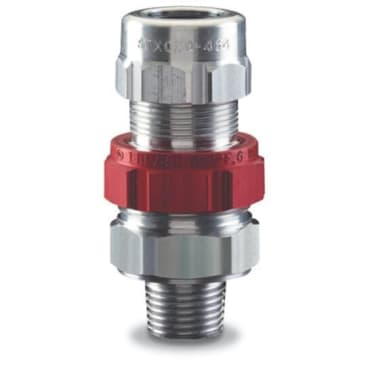Thank you for visiting Bartle & Gibson. If you encounter any issues or have feedback to share, please email us at [email protected]. Your input is greatly appreciated!

ABB STX050-464 1/2 STAR TECK XP CONN
Product Details
Attributes
Features
Resources
T&B® Fittings Star Teck® XP Teck Cable Connector, Series: STX, 1/2 in, Cable Openings: 0.6 to 0.76 in, JMC/TECK Cable, NPT, Aluminum, Red/Silver, 1.63 in Dia x 2.5 in L
Working with engineers from the Canadian petrochemical, oil and gas industries, Thomas & Betts then introduced the STAR TECK XP fitting. With an easy-to-fill, integral sealing chamber and a disconnectable design requiring minimal cable preparation, this fitting became the benchmark for ease of installation in hazardous environments. A line of liquid and putty sealants was also developed at the same time, eliminating the need for the cement sealants used up to this point.
- Working with engineers from the Canadian petrochemical, oil and gas industries, Thomas and Betts then introduced the STAR TECK XP fitting
- A line of liquid and putty sealants was also developed at the same time, eliminating the need for the cement sealants used up to this point
Product Details
T&B® Fittings Star Teck® XP Teck Cable Connector, Series: STX, 1/2 in, Cable Openings: 0.6 to 0.76 in, JMC/TECK Cable, NPT, Aluminum, Red/Silver, 1.63 in Dia x 2.5 in L
Working with engineers from the Canadian petrochemical, oil and gas industries, Thomas & Betts then introduced the STAR TECK XP fitting. With an easy-to-fill, integral sealing chamber and a disconnectable design requiring minimal cable preparation, this fitting became the benchmark for ease of installation in hazardous environments. A line of liquid and putty sealants was also developed at the same time, eliminating the need for the cement sealants used up to this point.
Attributes
Features
- Working with engineers from the Canadian petrochemical, oil and gas industries, Thomas and Betts then introduced the STAR TECK XP fitting
- A line of liquid and putty sealants was also developed at the same time, eliminating the need for the cement sealants used up to this point
